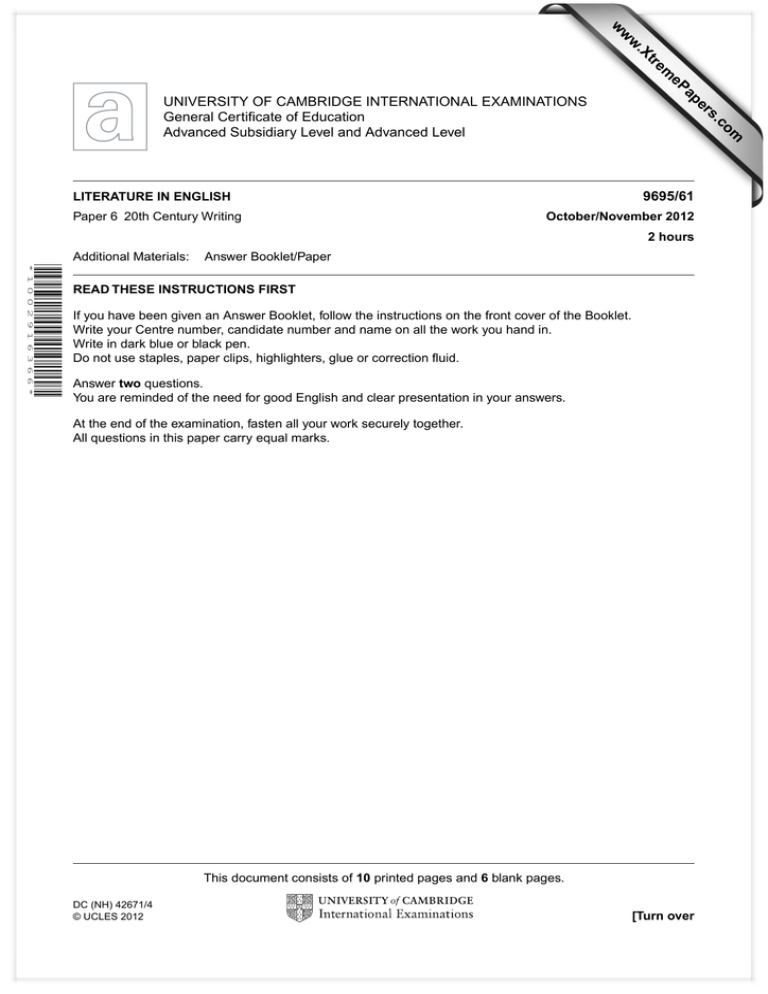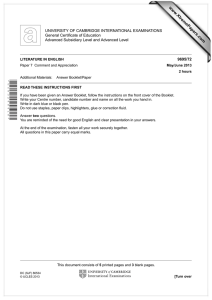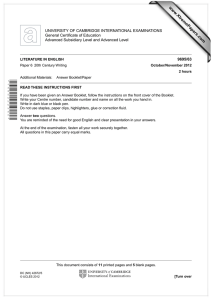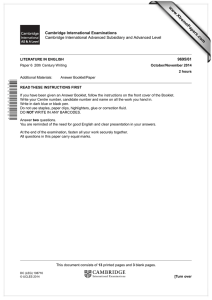
w
w
om
.c
s
er
9695/61
LITERATURE IN ENGLISH
Paper 6 20th Century Writing
ap
eP
m
e
tr
.X
w
UNIVERSITY OF CAMBRIDGE INTERNATIONAL EXAMINATIONS
General Certificate of Education
Advanced Subsidiary Level and Advanced Level
October/November 2012
2 hours
* 1 0 0 2 9 1 6 3 6 6 *
Additional Materials:
Answer Booklet/Paper
READ THESE INSTRUCTIONS FIRST
If you have been given an Answer Booklet, follow the instructions on the front cover of the Booklet.
Write your Centre number, candidate number and name on all the work you hand in.
Write in dark blue or black pen.
Do not use staples, paper clips, highlighters, glue or correction fluid.
Answer two questions.
You are reminded of the need for good English and clear presentation in your answers.
At the end of the examination, fasten all your work securely together.
All questions in this paper carry equal marks.
This document consists of 10 printed pages and 6 blank pages.
DC (NH) 42671/4
© UCLES 2012
[Turn over
2
FLEUR ADCOCK: Collected Poems
1
Either
(a) By what means and with what effects does Adcock present the idea of home? You
should make detailed reference to three poems.
Or
(b) Write a critical appreciation of the following poem, showing how far it is characteristic
of Adcock’s methods and concerns.
A Way Out
The other option’s to become a bird.
That’s kindly done, to guess from how they sing,
decently independent of the word
as we are not; and how they use the air
to sail as we might soaring on a swing
higher and higher; but the rope’s not there,
it’s free fall upward, out into the sky;
or if the arc veer downward, then it’s planned:
a bird can loiter, skimming just as high
as lets him supervise the hazel copse,
the turnip field, the orchard, and then land
on just the twig he’s chosen. Down he drops
to feed, if so it be: a pretty killer,
a keen-eyed stomach weighted like a dart.
He feels no pity for the caterpillar,
that moistly munching hoop of innocent green.
It is such tender lapses twist the heart.
A bird’s heart is a tight little red bean,
untwistable. His beak is made of bone,
his feet apparently of stainless wire;
his coat’s impermeable; his nest’s his own.
The clogging multiplicity of things
amongst which other creatures, battling, tire
can be evaded by a pair of wings.
The point is, most of it occurs below,
earthed at the levels of the grovelling wood
and gritty buildings. Up’s the way to go.
If it’s escapist, if it’s like a dream
the dream’s prolonged until it ends for good.
I see no disadvantage in the scheme.
© UCLES 2012
9695/61/O/N/12
5
10
15
20
25
30
3
W.H. AUDEN: Selected Poems
2
Either
(a) By what means and with what effects does Auden focus on the impact of a particular
moment? You should make detailed reference to three poems from this selection.
Or
(b) Focusing on Auden’s poetic methods and effects, write a critical appreciation of the
following poem.
The Unknown Citizen
To JS/07/M/378
This Marble Monument is Erected by the State
Content removed due to copyright restrictions.
© UCLES 2012
9695/61/O/N/12
[Turn over
4
JANET FRAME: Towards Another Summer
3
Either
(a) ‘Nothing was simple, known, safe, believed, identified.’
By what means and with what effects does Frame present insecurity in the novel?
(b) Discuss the effects of the writing in the following passage, showing in what ways it is
characteristic of Frame’s methods and concerns.
Or
She had almost reached the street when a woman emerged from one of the terraced
houses facing the park. Her dress was patched in black and white, outlined sharply
against the grey day. To Grace’s astonishment the woman suddenly flapped her arms
then opening her mouth she screeched three times and then was silent. Then she
began screeching again. Grace stared at her black and white patched dress, listened
to the screeching, and thought, —She’ s a magpie, she’s not a woman, she’s a bird.
As she watched the woman more closely she saw the final change taking place in
her – she had surprised her in private metamorphosis – she saw the arms mould
themselves to wings, the black and white patched dress change to feathers about
her body, her nose extend sharply to form a beak. There was no need for her voice
to change. She began screeching once more; she was calling someone, her children.
She flapped her wings belligerently as Grace passed her, she turned her bright fierce
eyes towards her, then she dropped one wing limply at her side and fluttering the
other as if clearing an obstacle from the air, she resumed her screeching.
No, it’s not the call of the magpie, Grace considered. Perhaps she is a marsh
bird; a plover, peewit; why should I see her here, now? Does she know that I too
have changed to a bird? That it is time for me to fly towards another summer?
—See anything interesting on your walk?
—I was walking in the park when I saw a woman changed to a bird –
Why should she not speak the truth at least once in her life? The need to tell
Philip and Anne, to stand in the big untidy kitchen and say, aloud, I saw a woman
change to a bird, was so desperate that Grace did not know how she would be able to
prevent herself from telling. She knew there would be embarrassing consequences.
Hasty Reassurances. The subject switched to one more harmless. Her limited social
experience made her feel certain of the response to her news; she did not question
the accuracy of her forecast, although she knew she was being unfair to Philip and
Anne. Perhaps for the first time in her life she was among people whose imagination
was not housed in a small dark room with no windows, whose understanding and
sympathy were liberal, adventurous.
Why not tell them, why not explain? she said to herself . I don’t wish to inhabit
the human world under false pretences. I’m relieved to have discovered my identity
after being so confused about it for so many years. Why should people be afraid if
I confide in them? Yet people will always be afraid and jealous of those who finally
establish their identity; it leads them to consider their own, to seclude it, cosset it, for
fear it may be borrowed or interfered with, and when they are in the act of protecting
it they suffer the shock of realising that their identity is nothing, it is something they
dreamed and never knew; and then begins the painstaking search – what shall they
choose – beast? another human being? insect? bird?
If I confide that I have become a bird, others may want to change in the same
way; or the shock may be so great that even Philip and Anne, who have qualities
of mind to deal with unexpected situations, may not be able to adapt themselves in
time, to accept the truth of my identity. The strain of constant adaptation to so many
fearful events and discoveries is already too much to bear with sanity; one has to
keep pretending to slip successfully into the new mould; a time will come when the
tailored and camouflaged mind breaks beneath the burden; the stick insect in our
brains no longer cares to resemble a twig on the same habitual human tree in the
mere hope that it may survive extinction.
Chapter 13
© UCLES 2012
9695/61/O/N/12
5
10
15
20
25
30
35
40
45
5
BLANK PAGE
TURN OVER FOR QUESTION 4
© UCLES 2012
9695/61/O/N/12
[Turn over
6
BRIAN FRIEL: Translations
4
Either
(a) Discuss the significance of renaming in the play, and with reference to particular
scenes, show how Friel uses the idea to create a variety of dramatic effects.
Or
(b) Comment on the language and action in the following scene, to show how Friel
shapes an audience’s response to the characters.
Maire:
Shhh.
Content removed due to copyright restrictions.
Music to crescendo.
© UCLES 2012
Act 2, Scene 2
9695/61/O/N/12
8
ARUNDHATI ROY: The God of Small Things
5
Either
(a) By what means and with what effects does Roy present a child’s view of the world?
Or
(b) Discuss the effects of the writing in the following passage, paying close attention to
the way Roy presents character and suggests the wider concerns of the novel.
It was his smile that reminded Ammu of Velutha as a little boy.
Content removed due to copyright restrictions.
Ammu walked up to the verandah, back into the Play. Shaking.
Chapter 8
© UCLES 2012
9695/61/O/N/12
9
BLANK PAGE
TURN OVER FOR QUESTION 6
© UCLES 2012
9695/61/O/N/12
[Turn over
10
WOLE SOYINKA: The Trials of Brother Jero and Jero’s Metamorphosis
6
Either
(a) ‘The comedy in the plays is visual, verbal, and used to expose human weakness.’
With reference to particular scenes, discuss the plays in the light of this comment.
(b) Discuss the dramatic effects of the writing in the f ollowing extract, considering the
ways Soyinka shapes an audience’ s response to the FKDUDFWHUV and concerns of
the play.
Or
Executive:
Is this the woman?
Content removed due to copyright restrictions.
Rebecca:
... Oh sir, you must let Brother Jero talk to you about the evil in your plans.
Jero’s Metamorphosis, Scene 1
© UCLES 2012
9695/61/O/N/12
12
VIRGINIA WOOLF: To the Lighthouse
7
Either
(a) By what means and with what effects does Woolf portray the Ramsays’ marriage?
Or
(b) Write a critical appreciation of the following passage, to show how its narrative
methods and concerns are characteristic of the novel as a whole.
She seemed to have shrivelled slightly, he thought. She looked a little skimpy, wispy;
but not unattractive. He liked her. There had been some talk of her marrying William
Bankes once, but nothing had come of it. His wife had been fond of her. He had
been a little out of temper too at breakfast. And then, and then – this was one of
those moments when an enor mous need urged him, without being conscious what
it was, to approach any woman, to force them, he did not care how, his need was so
great, to give him what he wanted: sympathy.
Was anybody looking after her? he said. Had she everything she wanted?
‘Oh, thanks, everything,’ said Lily Briscoe nervously. No; she could not do it.
She ought to have floated off instantly upon some wave of sympathetic expansion:
the pressure on her w as tremendous. But she remained stuc k. There was an awful
pause. They both looked at the sea. Why, thought Mr Ramsay, should she look at the
sea when I am here? She hoped it would be calm enough for them to land at the
Lighthouse, she said. The Lighthouse! The Lighthouse! What’s that got to do with it?
he thought impatiently. Instantly, with the force of some pr imeval gust (for really he
could not restrain himself any longer), there issued from him such a groan that any
other woman in the whole world would have done something, said something – all
except myself, thought Lily, girding at herself bitterly, who am not a woman, but a
peevish, ill-tempered, dried-up old maid presumably.
Mr Ramsay sighed to the full. He waited. Was she not going to say anything?
Did she not see what he wanted from her? Then he said he had a particular reason
for wanting to go to the Lighthouse. His wife used to send the men things. There
was a poor boy with a tuberculous hip, the lightkeeper’s son. He sighed profoundly.
He sighed significantly. All Lily wished was that this enormous flood of grief, this
insatiable hunger for sympathy, this demand that she should surrender herself up
to him entirely, and even so he had sorrows enough to k eep her supplied f or ever,
should leave her, should be div erted (she kept looking at the house , hoping for an
interruption) before it swept her down in its flow.
‘Such expeditions,’ said Mr Ramsay, scraping the ground with his toe, ‘are very
painful.’ Still Lily said nothing. (She is a stock, she is a stone, he said to himself .)
‘They are very exhausting,’ he said, looking, with a sickly look that nauseated her
(he was acting, she felt, this g reat man w as dramatising himself), at his beautiful
hands. It was horrible, it was indecent. Would they never come, she asked, for she
could not sustain this enormous weight of sorrow, support these heavy draperies of
grief (he had assumed a pose of extreme decrepitude; he even tottered a little as he
stood there) a moment longer.
Still she could say nothing; the whole horizon seemed swept bare of objects to talk
about; could only feel, amazedly, as Mr Ramsay stood there, how his gaze seemed to
fall dolefully over the sunny grass and discolour it, and cast over the rubicund, drowsy,
entirely contented figure of Mr Car michael, reading a French novel on a deckchair, a
veil of crape, as if such an existence, flaunting its prosperity in a world of woe, were
enough to pro voke the most dismal thoughts of all. Look at him, he seemed to be
saying; look at me; and indeed, all the time he was feeling, Think of me, think of me.
Part 3, Chapter 2
© UCLES 2012
9695/61/O/N/12
5
10
15
20
25
30
35
40
16
BLANK PAGE
Copyright Acknowledgements:
Question 1b
Question 2b
Question 3b
Question 4b
Question 5b
Question 6b
Question 7b
© Fleur Adcock; A Way Out from Poems 1960–2000 ; Bloodaxe Books; 2000.
© Edward Mendelson; The Unknown Citizen from W.H. Auden Selected Poems; Faber & Faber Ltd; 1979.
© Janet Frame; Towards Another Summer ; Virago Press; 2008. Janet Frame Literary Trust, 2007. All rights reserved.
© Brian Friel; Translations; Faber & Faber Ltd; 1981.
© Arundhati Roy; The God of Small Things; Flamingo; 1997.
© Wole Soyinka; The Trials of Brother Jero and Jero’s Metamorphosis from Collected Plays 2 ; Oxford University Press; 1974.
© Virginia Woolf; To The Lighthouse; Penguin Classics; 1992.
Permission to reproduce items where third-party owned material protected by copyright is included has been sought and cleared where possible. Every
reasonable effort has been made by the publisher (UCLES) to tr ace copyright holders, but if any items requiring clearance have unwittingly been included, the
publisher will be pleased to make amends at the earliest possible opportunity.
University of Cambr idge International Examinations is part of the Cambridge Assessment Group. Cambridge Assessment is the brand name of University of
Cambridge Local Examinations Syndicate (UCLES), which is itself a department of the University of Cambridge.
© UCLES 2012
9695/61/O/N/12












